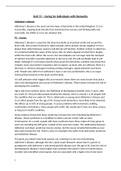Unit 17 – Caring for individuals with Dementia
Alzheimer’s disease
Alzheimer’s disease is the most common type of dementia in the United Kingdom. It is an
irreversible, ongoing brain disorder that slowly destroy memory and thinking skills and
eventually, the ability to carry out simplest task.
P1 – Causes
Alzheimer’s disease is caused by the abnormal build-up of protein inside and around the
brain cells. One protein involved is called amyloid, where protein clumps together to form
plaque that collect between neurons and disrupt cell function. Another protein is called Tau,
it’s contained within the axons of the nerve cells. Its where deposit of which form tangles
within the brain cells. When this occurs, the microtubules can no longer help the transport
of nutrient and other essential substance in the nerve cell, this will eventually lead to cell
death. Although it’s not known exactly what causes this dementia, scientists now know that
it begins many years before symptoms start to appear. As brain cells are affected, there is a
decrease in chemical messages involving sending messages, signals between each brain
cells. People who suffer from Alzheimer's have a very low acetylcholine, this is an organ
chemical that functions in the brain and the body.
It is still unknown what triggers this, but research shows there are many factors that play a
role in the development and course of Alzheimer's disease. These factors increase the risk of
developing this condition.
Age is the most common factor, the likelihood of developing it doubles every 5 years, after
you reach 65. Not just older people develop this disease, there is around 1 in 20 people with
the condition that are under 65. This is called early or young-onset Alzheimer’s disease and
it can affect people from the age of 40. Young-onset dementia is more likely to be inherited,
this affects up to 10% of young people. It causes problems with movement, walking,
coordination and balance. Many people who suffer this usually don’t have any other serious
or long-term health conditions.
Some evidence shows that down syndrome increases the risk of developing Alzheimer's
disease. Down syndrome is a condition in which a person is born with an extra
chromosome. As a result, people with down syndrome have three copies of many genes in
each cell, including the APP gene, instead of the usual two copies. The relationship between
Alzheimer and down syndrome may be unclear, but the excess amyloid beta builds up over
time and increase the risk. There is only 1% of people who suffer from both down syndrome
and Alzheimer disease.
The genes you inherit from both parents can contribute to the risk of developing
Alzheimer’s disease, although the risk is quite small. Research shows that if a parent or
grandparent with Alzheimer's who developed the disease over the age of 65, then the risk of
developing the disease is much higher than someone who doesn’t have no family history.
Scientist have identified several genes that are associated with a higher risk of late-onset
1




